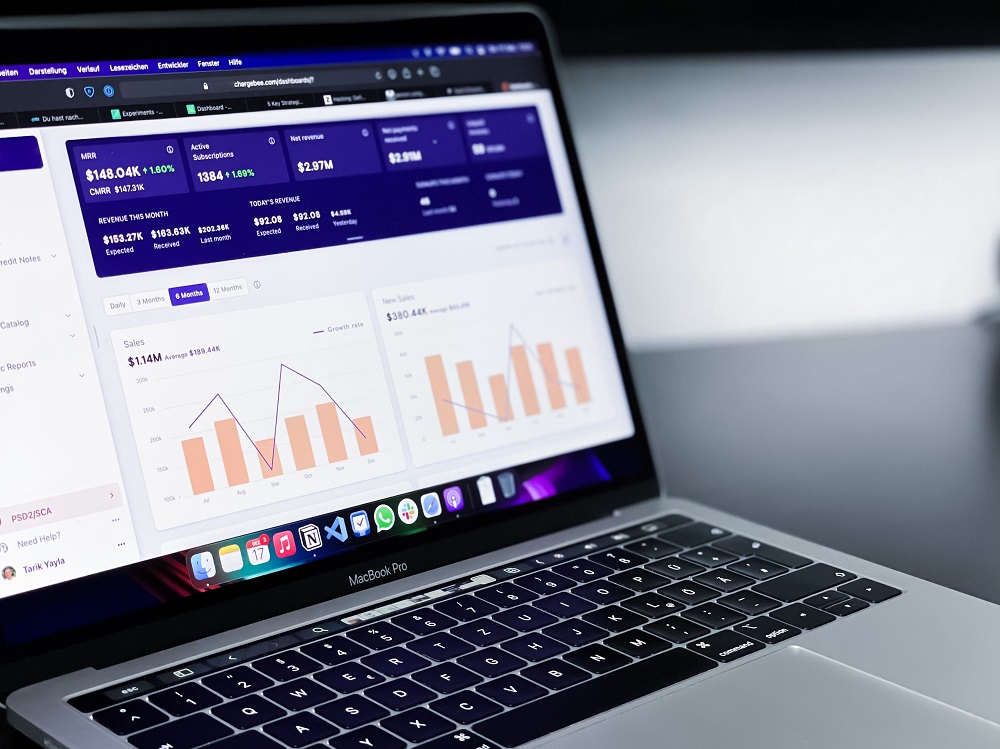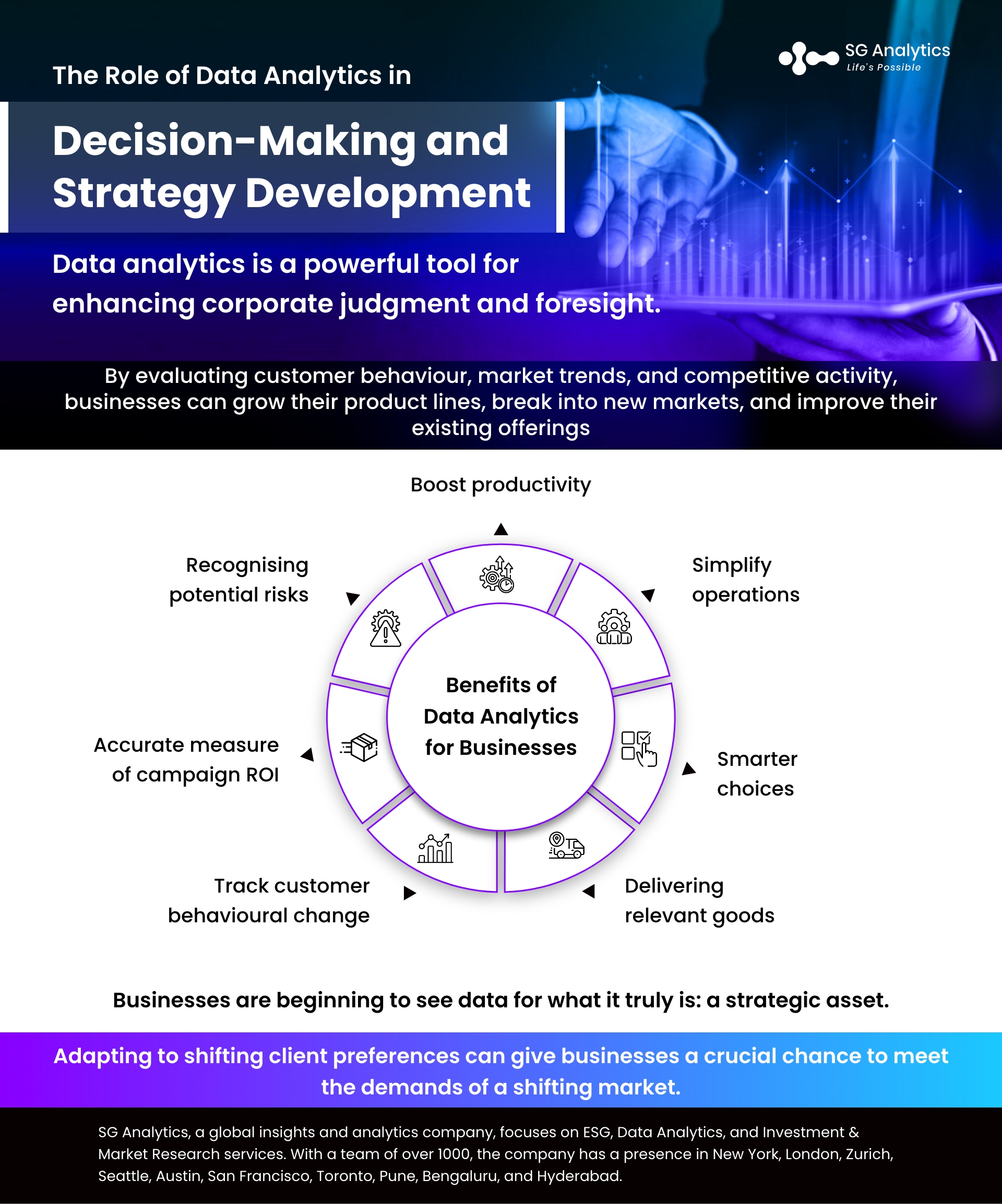Data analytics is a powerful tool for enhancing corporate judgment and foresight. Data collection and analysis may teach businesses a great deal about their operations, consumers, and rivals. This knowledge improves product development, marketing, and the distribution of scarce company resources.
Data analytics has the potential to improve how businesses allocate resources, reduce costs, and increase output. Companies can see where they are succeeding and where they are falling short through data analysis. Reduced costs and increased productivity may increase profits and competitiveness.
Businesses can benefit from data analytics in decision-making since it helps them discover new growth opportunities. By evaluating customer behaviour, market trends, and competitive activity, businesses can grow their product lines, break into new markets, and improve their existing offerings.

Benefits of Data Analytics for Businesses
In many industries, data analytics plays a key role in both day-to-day operations and long-term planning. Collecting, analyzing, and interpreting massive amounts of data with the help of statistical and quantitative methodologies in order to develop useful conclusions and facilitate well-informed decision-making. The use of statistics and other quantitative techniques is made.
Some of the benefits are:
Recognising potential risks
Successful operations in today's high-risk business climate call for key risk processes, and the availability of vast amounts of data has facilitated the development of novel risk management solutions. Essential simulations may be made more accurate with the help of big data, allowing for improved risk prediction and preparation.

Boost productivity
It might be beneficial to your organization's aims to analyze massive data sets rapidly and provide the results in a structured manner. By facilitating managers' dissemination of information to their staff, it fosters an atmosphere of effectiveness and cooperation. The company's opportunities and advancements are mirrored, and taking advantage of them can boost productivity and efficiency on the job.
Simplify operations
Data mining is a useful tool for businesses to employ to get what they want. The causes of production delays or uncertainties can be uncovered by the collection and analysis of supplier data, which in turn can assist in predicting four potential issues. A corporation may choose to augment or replace a supplier if the prediction indicates that it will not be able to handle the necessary volume over the holiday season.
Furthermore, many businesses, particularly in the retail industry, are having trouble maintaining historically high-performance levels. Season, holidays, and weather are just a few examples of how the data can be used to inform the company's best product promotion.

Smarter choices
One major benefit of data mining is that it helps people make better decisions in the long run. In the business world, data is replacing expertise as the primary decision-making factor. By gathering data in real-time and analyzing historical data, businesses may build prediction models and maintain a competitive edge. A company's capacity to acquire high-quality data is enhanced by the combination of big data with AI, machine learning, and data analytics.
Delivering relevant goods
The lifeblood of any business, and frequently the largest investment businesses, are their products. Trends that motivate strategic innovation and action plans for new features and services are the responsibility of the product management team.
Companies that foster an environment where employees feel comfortable sharing their thoughts and findings with other departments are better able to compete. Especially as technologies advance and consumer preferences shift. It also facilitates a clearer understanding of the requirements of the market for product delivery prior to placing an order.

Accurate measure of campaign ROI
For a long time, the market has struggled with accurately measuring the return on investment (ROI) of a campaign. Any advertising, communication, or strategies used to improve customer engagement can be evaluated with the use of cutting-edge analytics software.
With this information, businesses may better prepare for the future by determining which strategies, activities, and materials proved most effective. This summary will also aid businesses in comprehending budgetary choices.
Track customer behavioural changes
Consumers in the modern world have a wide variety of options. There will be a downward spiral for businesses that ignore customer demands and expectations. In today's day of constant updates, consumers' opinions are easily swayed.

It is nearly hard for businesses to grasp all changes in customer data without applying analytics due to the sheer volume of consumer data. Through analytics, you may see how your market has changed and what people are thinking. As a result, adapting to shifting client preferences can give businesses a crucial chance to meet the demands of a shifting market.
Complex supplier networks
With the help of big data, businesses may offer more precise community sales and B2B connections. By analyzing massive amounts of data, service companies can avoid common errors. Consumers can gain the superior technological acumen necessary for success by utilizing big data. Administrators in the supply chain now view this as a game-changing technical advancement that will alter the structure of the retail industry at its four apex levels. Sharing this information online helps people address issues from many angles.
Also Read - How can Data Analytics Improve Customer Service?

Conclusion
In today's data age, businesses of all sizes are beginning to see data for what it truly is: a strategic asset. Data and analytics can enlighten and transform any organization, from a tiny nonprofit wanting to better understand its contributors to a huge multinational aiming to optimize its supply chain.
Similarly, universities have recently come to appreciate the strategic importance of their data. They are increasingly relying on analytics gleaned from data to guide their actions and boost the quality of their programmes and, ultimately, the lives of their students.
With the help of data analytics, businesses may improve operations, learn more about their customers, evaluate the state of the market, mitigate threats, and create winning strategies. In today's data-driven business market, organizations can gain an edge by using data analytics in decision-making.
SGA’s expertise lies across the entire data lifecycle. We work towards making data-driven insights speak through our data analytics services and solutions.
At SGA, the data analytics ecosystem is built upon four strong pillars of data and analytics strategy and insights.









